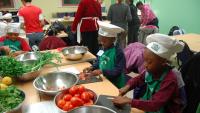Projects

GetHealthyHarlem.org (GHH)
Between 2004 and 2009 HHPC’s research goals were focused on the creation and evaluation of GetHealthyHarlem.org (GHH), a consumer health information website that provides Harlem residents, businesses and organizations with geographically-focused information about getting and staying healthy. Since 2008, GHH has continued to serve the Upper Manhattan community. It is thriving as a source of geographically-focused health information with more than 7,000 pageviews and nearly 3,000 users using the site each month. With the capacity to host free microsites, GHH is an important resource to both academic and community partners.
Site highlights:
-
The result of years of collaboration between HHPC, academic partners, as well as community members and leaders, GetHealthyHarlem.org combines health information, social networking, and microsite hosting to connect diverse groups in a truly groundbreaking format.
-
GHH educates Harlem residents about health and wellness issues through customized content written expressly for the Harlem and Upper Manhattan communities; provides a dynamic interactive environment for academic groups to promote community-based participatory research endeavors; and allows community members to share key information, such as news and events, through this free venue.
-
GHH is a sustainable project serving New York City communities through many key roles in public health efforts:
-
GHH serves as an integral educational component of HHPC’s project, Bridge Up which serves young people in Manhattan and the Bronx through health education.
-
HHPC’s recent partnership with the Irving Institute for Clincial and Translational Research, one of the first 12 U.S. institutions to receive a Clinical and Translational Science Award (CTSA), will allow GHH to serve as an important tool for our partners to engage community around health-related studies. For more information on Columbia's CTSA and on GetHealthyHarlem.org's sister site for Washington Heights, GetHealthyHeights.org visit the Irving Institute website here.
Project STAY (Services to Assist Youth)
The Harlem Health Promotion Center’s service arm accomplishes its health service delivery goals through a client-centered model and integrative team approach. It provides developmentally-appropriate medical and psychosocial services for adolescents and young adults living with HIV/AIDS in and around New York City. The STAY team is composed of medical providers, social workers, and health educators. STAY has been designated a regional Specialized Care Center for adolescent HIV services by the New York State Department of Health’s AIDS Institute. Currently, 65 HIV+ clients are enrolled in care. Clinical services are delivered to clients between 13 and 24 at one of New York Presbyterian Hospital’s (NYP) Ambulatory Care Network Center sites located at 21 Audubon Avenue in Washington Heights. Psychosocial, case management, and counseling services are delivered at NYP’s Vanderbilt Clinic on 168th Street.
Youth Access Program (YAP)
HHPC uses trained health educators to provide outreach, education, counseling, and screening to adolescents in community settings around a variety of health topics. Specifically, Project STAY’s YAP provides sexual and reproductive health education and services to African-American and Hispanic youth between the ages of 13 and 24 in Harlem and throughout the New York City area. YAP staff, consisting of clinicians, social workers and health educators, work closely with various youth-oriented partners, including high schools and community-based organizations to engage young people though interactive multimedia group workshops, individualized counseling, non-invasive screening for pregnancy, sexually transmitted infections (STIs), and HIV. In addition, the YAP also provides training tools and technical assistance in various forms. Over the past three years, the YAP program has worked directly with 18 high schools and 13 community-based organizations. In the past year, with funding from the NYS Department of Health and the Robin Hood Foundation was able to reach over 2,500 young people through its educational workshops, 750 of whom went on to participate in counseling and testing services.